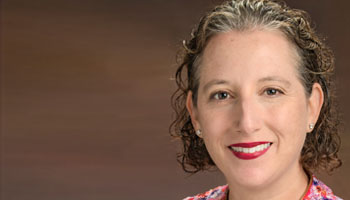HOW CAN WE HELP YOU? Call 1-800-TRY-CHOP
In This Section
Football Concussions, Early Intervention Referrals, Mitochondrial DNA, Panama TV, ‘Research in Motion,’ Bone Marrow Failure

mccannn [at] email.chop.edu (By Nancy McCann)
Fall is in the air! And with it comes a trifecta of football-related concussion papers in this week’s roundup of research headlines. Also, read about the need for increased access to early intervention referrals for developmental delays and the guidelines for genomic variants in mitochondrial DNA. Learn who among us has been featured on Panama television and which CHOP-hosted symposium was a virtual success. And make sure you tune into “Research in Motion,” PolicyLab’s new video series.
October is for Football Concussion Papers

Kristy Arbogast, PhD
The American tradition of football comes around each fall, but this October also brings a field goal number of football-related concussion papers, co-authored by CHOP researchers.
Kristy Arbogast, PhD, co-scientific director and director of Engineering for the Center for Injury Research and Prevention, co-authored two studies published in the Annals of Biological Engineering. The findings of Position-Specific Circumstances of Concussions in the NFL: Toward the Development of Position-Specific Helmets showed some features of concussion scenarios are common to all positions, but several position-specific features exist and can inform the design of position-specific helmets for NFL players.
The study On-Field Performance of an Instrumented Mouthguard for Detecting Head Impacts in American Football, describes the development and evaluation of a head impact detection system consisting of a mouthguard sensor and machine learning (ML) model for distinguishing head impacts from spurious (non-head impact) events in football games. The results revealed that the mouthguard sensor alone detected 81 percent of video-confirmed head impacts, while the ML classifier provided 98 percent precision and 100 percent recall, resulting in an overall head impact detection system that achieved 98 percent precision and nearly 82 percent recall.
Patrick Cahill, MD, a pediatric spine specialist, and Keith Baldwin, MD, MPH, MSPT, director of Orthopedic Trauma, are co-authors of the study, American Football is the Youth Sporting Activity Most Commonly Associated with Acute Vertebral Fractures, published in The Physician and Sportsmedicine. This research addressed one risk of sports participation, acute vertebral fracture, an injury with significant morbidity. The findings showed American football was the youth sport most frequently associated with acute vertebral fractures presenting to United States emergency departments.
Symposium for Bone Marrow Failure Community — A Virtual Success
The Comprehensive Bone Marrow Failure Center (CBMFC) at CHOP co-hosted the fourth annual North American Pediatric Aplastic Anemia Consortium (NAPAAC) Symposium. The two-day, first-ever virtual event, held earlier this month, was quite a success with 350 attendees from across 34 states and 15 countries.
Nineteen international speakers, including our own Marilyn Li, MD, vice-chief of the Division of Genomic Diagnostics and director of Cancer Genomic Diagnostics, covered the latest advances in the field including genetics and molecular diagnostics, protein metabolism in bone marrow failure (BMF), transplant, neuropyschological manifestations and testing, age transition, and cancer surveillance. The conference aimed to help practitioners gain vital knowledge and improve diagnostic yields and patient outcomes.

Peter Kurre, MD
“With well over 300 attendees, the joint CHOP-NAPAAC Symposium was by far the best attended meeting for the growing nationwide BMF community,” said Peter Kurre, MD, director of the CBMFC. “That success owes much to the seamless teamwork between Information Services, CME, and organizers here at CHOP. Our experience illustrates the potential power of virtual meetings to bring the community together and explore the critical issues in BMF science and patient care.”
Disparities in Early Intervention Referrals for Developmental Delays

Kate Wallis, MD, MPH
White children are more likely to be referred for early intervention for developmental delays prior to developmental screening, while Black children are more likely to be referred after a positive developmental screen. These findings, published in the Journal of Developmental & Behavioral Pediatrics, reinforce the need for better universal surveillance for developmental delays and increased access to early intervention, according to first author Kate Wallis, MD, MPH, an attending physician in the Division of Developmental and Behavioral Pediatrics, and an instructor at PolicyLab, both at CHOP.
Prior research emphasized that early intervention can be critical for children with a range of developmental issues, consistently resulting in improved lifetime outcomes. It also revealed disparities in early intervention, with children from minority and low-income backgrounds more likely to have a delayed or missed diagnosis. To determine the extent of these disparities, the study team examined racial, ethnic, and sex differences in referral status after a positive developmental screen at 18 or 24 months.
“We wanted to characterize which children were more likely to already be enrolled in early intervention, and which were referred only after the 18 or 24 month recommended screenings,” Dr. Wallis said. “By determining which groups might be experiencing critical delays in early intervention, we can develop appropriate recommendations for how to decrease those disparities.”
Go to CHOP News for study details, and check out her “Research in Motion” video below in ICYMI.
CHOP Researchers Develop Standards for Mitochondrial DNA Variant Interpretation
Researchers in CHOP’s Mitochondrial Medicine Frontier Program led an international collaboration of mtDNA experts in an effort to standardize how variants in mitochondrial DNA (mtDNA) are interpreted, detailing the unique aspects of the mtDNA genome and outlining when specific variants may cause medical problems when detected in a patient.
Working from the 2015 American College of Medical Genetics (ACMG) and Association of Molecular Pathology (AMP) standards and guidelines that are widely used for clinical interpretation of DNA sequence variants, the mtDNA Expert Panel working group determined consensus specifications to provide additional guidance for mtDNA variant classification. Unique aspects of mtDNA were addressed to properly classify its variants, including addressing mtDNA genome composition and structure, maternal inheritance, heteroplasmy, functional analyses unique to mtDNA, and the heterogeneous presentations of mitochondrial disease.

Marni Falk, MD
“This work represents the culmination of several years of collaboration by global leaders in mtDNA genomics and disease, all aimed at improving the ability of labs and clinicians around the world to more accurately diagnose patients with mtDNA-based mitochondrial disease,” said study co-author Marni Falk, MD, executive director of the Mitochondrial Medicine Frontier Program at CHOP.
Read more in Human Mutation or this CHOP press release.
CHOP Endocrinology Chief Featured on Panama TV

Diva De León-Crutchlow, MD, MSCE
A major media outlet in Panama, selected our own Diva De León-Crutchlow, MD, MSCE, chief of the Division of Endocrinology and Diabetes and co-leader of the Advancement of Hyperinsulinism Care and Research Frontier Program, as one of the prominent Panamanians featured in a segment called “Mentes Brillantes,” or Brilliant Minds.
During the Spanish-language broadcast, De León-Crutchlow described her quadruple role as a physician who sees patients, a researcher who has her own lab, an administrator of the division, and a professor of Pediatrics in the Perelman School of Medicine at the University of Pennsylvania.
Dr. De León-Crutchlow also explained congenital hyperinsulinism (HI), why it is so dangerous for babies, and how her research focuses on finding better treatments and, hopefully, a cure for HI. CHOP’s HI Center is the largest, most active such center in the world.
“I enjoyed doing it, and it was great to talk about what a wonderful hospital CHOP is,” Dr. De León-Crutchlow said. “But my parents, who still live in Panama, are really loving it. Everyone they know has called them to talk about it. They’re having a blast.”
Visit CHOP News to learn more.
ICYMI
Policy Lab Launches New ‘Research in Motion’ Video Series
“Research in Motion,” is a dynamic new video series that enables viewers to hear directly from our researchers on how their ongoing work can contribute to policy and programs moving forward.

Ariel Williamson, PhD, DBSM
Two episodes are now running on PolicyLab’s YouTube channel. Check out “Getting your ZZZs: Impacts of Sleep on Child Well-being,” in which psychologist Ariel Williamson, PhD, DBSM, talks about the effects of sleep — or lack of sleep — on children. And meet developmental-behavioral pediatrician Kate Wallis, MD, MPH, as she discusses the importance of screening and identifying developmental concerns in children early in order to get them the support they need in “The Earlier the Better: Creating Equity in Developmental Screening.”
Also, catch up on our headlines from the Oct. 9 In the News:
- Signaling Pathway Stimulates Lung Tissue Repair, Points to Treatment for COVID Complications
- More Than 90 Percent of License Suspensions Not Related to Traffic Safety
- Precision Medicine Reverses Severe Lymphatic Disorder in Patient
- CHOP Joins Worldwide Consortium to Study Biomarkers, Natural History for Friedreich’s Ataxia
- CHOP Joins U.S. Health Systems Network to Declare: Racism is a Public Health Crisis
Keep up with our news, stories, and updates in real time by following us on Twitter, Facebook, LinkedIn, or Instagram. Or subscribe to our newsletter to get an email sent every other Friday by signing up here.


